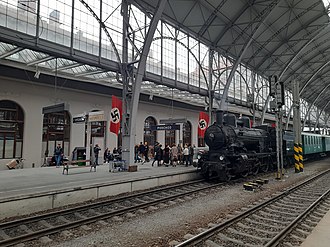Nicholas Winton!
We have a close friend named Debbie. In 1939, her mother Marianne Schorsch was only fifteen years old when she was put on board a special train (kindertransport) as she was in danger of death from the Nazis. It was an Englishman named Nicholas Winton who organized the escape trip for Marianne and hundreds of other children, to save them from the Nazis. Although Marianne is now passed on, my wife and I knew that gentle sweet woman for many years.
A special invitation
Last week, Debbie invited us to go to the cinema and see the film 'One Life' together, a film about Nicholas Winton and the 'kindertransport'. We accepted the invitation without thinking, and the film made a big impression on us.
One Life
Nicholas Winton was a banker and philanthropist, born in London in 1909. He was of Jewish descent, and his own parents immigrated to England from Germany at the beginning of the twentieth century.
At the beginning of the film, you see Winton (Anthony Hopkins) in 1987, as an old man. He wants to get rid of the clutter in his home office. There is a leather case in the cupboard but he has no intention of opening it. We are curious about him, when we are suddenly swept back to Prague in 1939. We see a young Winton there (Johnny Flynn) and the plight of the children in the city moves his heart, so he decides to help them. There are already a few English folk in Prague, trying to help political refugees escape to England. Winton convinces them to help him, and it is a constant battle against the existing bureaucracy. They have to complete paperwork and get visas for the children. Then, travel has to be organized, and host families found for them. And of course, they have to raise money to pay for everything. Winton and the team in Prague are brave. But not only them! Winton's mother (Helena Bonham Carter) is also active and does not take 'no' for an answer from the officials who have the power to shorten the processes! There is a strong emphasis on Winton and the children, so the cruelty of the Nazi regime is not seen much, except indirectly, when you see the Nazis getting rid of the ninth train organized by Winton. The train never got going, because the Nazis stopped it. Winton felt guilty about that most of his life, because he knew that most of the children were lost.
Jumping forward fifty years, you see Winton as an old man again. Until then, Winton had not spoken about his part in rescuing the children. His wife Grete doesn't know about it, until she sees the old book in the leather case. It is filled with photographs, letters from the families and the names of the children. She takes the book to Elisabeth Maxwell, Holocaust researcher, and wife of Robert Maxwell. When Robert hears about Winton, he publishes an article in his 'Sunday People' newspaper, which leads to the 'That's Life' special. Winton is dubbed "Britain's Schindler" by the media, referring to the German businessman Oskar Schindler, who saved 1,200 Jews from the Holocaust.
In a landmark 1988 episode of the BBC TV program 'That's Life', Winton sits in the audience as the TV host, Esther Rantzen, begins to talk about his rescue of Czech children in 1939. As the camera pans over the audience, guests begin to stand up – these are some of the children (now older) that Winton rescued. This is the first time they have seen Winton in fifty years. Eventually, Winton realizes the importance of what he has done. Finally, too, he is able to deal with the guilt and sadness he has carried for the past fifty years, about the ninth train.
Honors
Nicholas Winton received a letter of thanks from the late Ezer Weizman, former president of the State of Israel. He was also made an honorary citizen of Prague. In 2002, Queen Elizabeth II knighted Winton for his services to humanity. He was named a British Holocaust Hero by the British Government in 2010. A statue dedicated to him outside Prague's main train station was unveiled in 2009. Finally, the Czech Republic awarded Winton the Order of the White Lion in 2014 for his rescue of the Czech children.
The Winton Train
On 1 September 2009 a special train took the original kindertransport route. Winton, along with survivors and their families went on the same journey as they had done seventy years before in 1939. Marianne and Debbie were on this train and it was a very special occasion for them. Debbie remembers that event, which gave her a new understanding of what happened. She also realized something else: Even in the abyss of despair, all is not lost. She herself is living proof of that!






